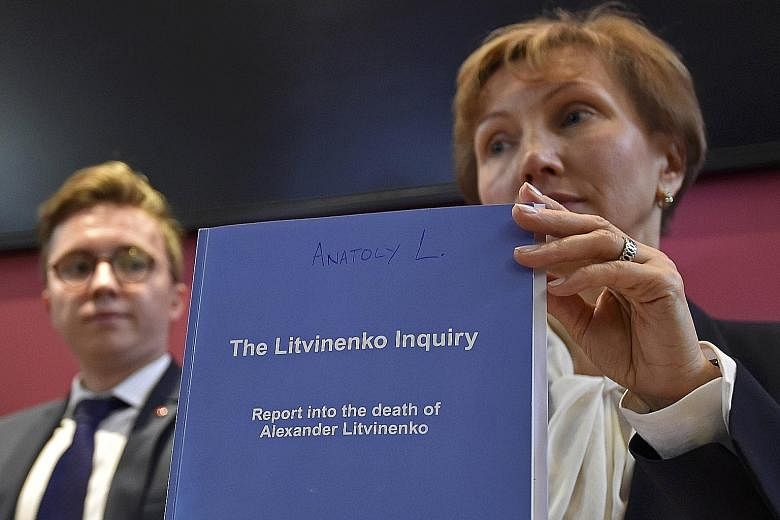LONDON • Moscow has dismissed as a "joke" a British inquiry's findings that Russian President Vladimir Putin "probably approved" the killing of former spy Alexander Litvinenko a decade ago in London.
Mr Litvinenko, a prominent Kremlin critic, died of radiation poisoning in 2006 aged 43, three weeks after drinking tea laced with radioactive polonium at an upmarket London hotel.
The inquiry on Thursday said that Mr Andrei Lugovoi and Mr Dmitri Kovtun, two Russians identified as prime suspects by British police, were likely to have carried out the poisoning on the instructions of the Russian security services.
Although Prime Minister David Cameron called it a "state-sponsored action", his government did not announce sanctions in response, instead summoning Moscow's ambassador to London for talks lasting less than an hour.
Russia was sharply dismissive of the conclusions.
"Maybe this is a joke," Mr Dmitry Peskov, a spokesman for Mr Putin, said. "More likely, it can be attributed to fine British humour - the fact that an open public inquiry is based on the classified data of special services, unnamed special services."
Mr Lugovoi, meanwhile, told the BBC that the inquiry had reached "nonsense conclusions".
"I saw nothing new... I am very sorry that 10 years on, nothing new has been presented, only invention, supposition, rumours," he said.
At the High Court in London on Thursday, there were cries of "Yes!" as the main findings were read out.
Mr Litvinenko's wife, Marina, dressed in black and accompanied by her 21-year-old son, Anatoly, embraced supporters afterwards. She has spent years pushing for a public inquiry and had urged sanctions and a travel ban on Mr Putin.
"I am very pleased that the words my husband spoke on his deathbed, when he accused Mr Putin of his murder, have been proven true in an English court," she said.
Judge Robert Owen, the inquiry's chairman, said he was "sure" Mr Lugovoi and Mr Kovtun placed polonium-210 in a teapot at the Millennium Hotel's Pine Bar, where they met Mr Litvinenko on Nov 1, 2006.
"The FSB operation to kill Litvinenko was probably approved by Mr (Nikolai) Patrushev and also by President Putin," the report said. Mr Patrushev was the director of the FSB, the successor organisation to the Soviet-era KGB spy agency, at the time of the incident and has been a key security official since 2008.
Polonium-210 is a rare radioactive isotope available only in closed nuclear facilities.
The report, which contained classified evidence redacted from the version made public, said this suggested that Mr Lugovoi and Mr Kovtun "were acting for a state body rather than, say, a criminal organisation". There was "no evidence" to suggest that either Mr Lugovoi or Mr Kovtun had any personal reason to kill Mr Litvinenko and they were likely to be acting under FSB direction, Judge Owen added.
Shortly after the report's release, London's Metropolitan Police issued a statement stressing they still wanted the pair to be extradited.
The judge said there were "powerful motives" for the killing. Mr Litvinenko was seen as "having betrayed the FSB" and had regularly targeted Mr Putin with "highly personal public criticism".
Mr Litvinenko, a former KGB agent who became a freelance investigator, also worked for British intelligence. He accused Mr Putin of ordering his killing in a statement before he died on Nov 23, 2006.
AGENCE FRANCE-PRESSE

